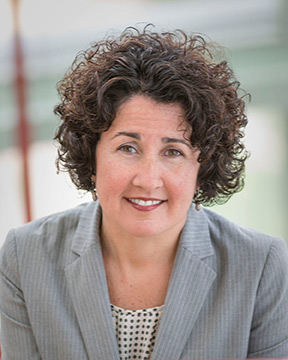
Chief strategist for Cleveland Clinic champions Wooster experience

Prioritizing and reprioritizing as well as using “out-of-the-box thinking” are strengths that Josette Beran ’95 uses every day as chief strategy officer for Cleveland Clinic. Since the onset of the novel coronavirus pandemic, she’s used a strategic lens to “consider the big picture and the macro trends that impact the organization,” she said. “We’ve had to ask ourselves what the worst-case scenario is and plan accordingly. This kind of thinking helped us focus on our surge preparedness.”
Beran says she first learned to balance multiple challenges as a student at The College of Wooster. “Wooster was challenging academically, so I had to focus on my studies and put in a lot of hard work. Learning how to prioritize, study effectively and build a strong work ethic are skills that prepared me for a diverse and complex career in health care. I spend every day prioritizing and then reprioritizing my work,” she said. Though she didn’t know what she wanted to do after graduation, the psychology major found the “breadth of coursework that you get in a liberal arts school and in psychology so important.” She added, “Even though the College is a small community you get exposed to so many wonderful experiences. Wooster was a great first step toward a professional career.” Completing her master’s in executive healthcare business administration at Baldwin Wallace University, Beran has been working for Cleveland Clinic for 19 years in a number of administrative roles including three years at Cleveland Clinic Abu Dhabi, overseeing the hospital startup. Her most recent years in leadership are focused on implementing strategies that support the organization’s mission.
“Our vision is to be the best place to receive care anywhere and the best place to work in healthcare. The strategy is what is going to get us there,” she said. “Although I don’t provide direct patient care, at Cleveland Clinic we’re all considered caregivers, and I have an impact on patient’s lives through the strategy that we develop and put in place.”
Canceling nonessential procedures to ensure the availability of personal and protective equipment, setting up surge hospitals in nontraditional settings, finding a source for making masks in the Amish community south of Wooster, and establishing new staffing models are just some of the strategies the organization has implemented as COVID-19 spreads. They also provided alternatives to patients through virtual visits. “Virtual care has always been a part of our strategy, given transitions in healthcare and patient preferences. Due to COVID-19, we saw tremendous growth in virtual care, from 5,000 to 200,000 virtual visits a month,” said Beran. She noted that after some initial strain on the system, both patients and caregivers adapted to the change. “Virtual is here to stay,” she added.
As states ease stay-at-home orders, “This is where we’ll need to continue to have a close eye on things and monitor the number of COVID-19 patients. We’re in that stage of watching to see if we could have a surge and at the same time focusing on recovery,” said Beran. Recovery for Cleveland Clinic includes “restarting the business” and “learning to live with COVID.” Emphasizing the organization’s commitment to caring for patients in a safe environment and protecting caregivers, she acknowledges the level of fear that patients are experiencing. “Part of the reactivation of services is helping patients understand that delaying healthcare because they’re afraid of COVID is a serious risk,” she explained. “Avoiding an emergency can lead to more serious health risks, and I think a byproduct of the pandemic has been the reduction in people seeking emergency services. We’ve been trying to educate the public that our hospitals are safe, open, and ready for care.” Precautions to ensure that safe environment include masks for patients and caregivers, limiting access to facilities, restricting visitation, canceling public events, reconfiguring waiting areas so that they support social distancing, and extensive cleaning. Beran credits the swift action of the government in Ohio for helping to contain the spread of the virus noting that the Cleveland Clinic system has not reached or exceeded capacity. “We’ve been able to manage things quite well,” she said.
Beran learned the importance of careful research and planning as a student at Wooster. She carried research from her junior Independent Study—investigating whether children’s eyewitness testimony could be influenced—into an experiment during her senior year. “I learned that smart planning like this can be a huge benefit. Preparing the paper and having to present was just the beginning of all of the presentations I would have to prepare and present in my professional career,” she said. Though on a different scale than the global pandemic, the experience influenced her perspective and taught her about the value of hard work: “With hard work and determination you can achieve anything,” Beran said. “I.S. sure seemed like the impossible when I started at Wooster. There are many things today that seem impossible but can be accomplished with hard work and determination. You really have to believe in yourself and get the support from others, very much like the I.S. experience.”
Posted in Alumni on June 3, 2020.
Related Posts
Related Areas of Study
Public Health
Explore the many options and paths for those who want to be part of the world of health care
PathwayPsychology
Do research, work with faculty mentors, and tailor a psychology program to your interests
Major Minor

